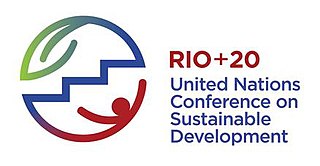
The University for Peace (UPEACE) is an international university and intergovernmental organization established as a treaty organisation by the United Nations General Assembly in 1980. The university offers postgraduate, doctoral, and executive programmes related to the study of peace and conflict, environment and development, and international law.

The International Union for Conservation of Nature (IUCN) is an international organization working in the field of nature conservation and sustainable use of natural resources. Founded in 1948, IUCN has become the global authority on the status of the natural world and the measures needed to safeguard it. It is involved in data gathering and analysis, research, field projects, advocacy, and education. IUCN's mission is to "influence, encourage and assist societies throughout the world to conserve nature and to ensure that any use of natural resources is equitable and ecologically sustainable".

The United Nations Conference on Environment and Development (UNCED), also known as the Rio de JaneiroConference or the Earth Summit, was a major United Nations conference held in Rio de Janeiro from 3 to 14 June 1992.
The United Nations Association of the United States of America (UNA-USA) is a nonprofit grassroots organization dedicated to promoting political and public support for the United Nations among Americans. It is a program of the United Nations Foundation. Its mission includes advocating for greater U.S. leadership at the UN, improving and enhancing the UN system, and implementing the Sustainable Development Goals and the UN Charter in both the U.S. and globally.

The Global Environment Facility (GEF) is a multilateral environmental fund that provides grants and blended finance for projects related to biodiversity, climate change, international waters, land degradation, persistent organic pollutants (POPs), mercury, sustainable forest management, food security, and sustainable cities in developing countries and countries with economies in transition. It is the largest source of multilateral funding for biodiversity globally and distributes more than $1 billion a year on average to address inter-related environmental challenges.
The Earth Charter is an international declaration of fundamental values and principles considered useful by its supporters for building a just, sustainable, and peaceful global society in the 21st century. Created by a global consultation process, and endorsed by organizations representing millions of people, the Charter "seeks to inspire in all peoples a sense of global interdependence and shared responsibility for the well-being of the human family, the greater community of life, and future generations." It calls upon humanity to help create a global partnership at a critical juncture in history. The Earth Charter's vision proposes that environmental protection, human rights, equitable human development, and peace are interdependent and indivisible. The Charter attempts to provide a new framework for thinking about and addressing these issues. The Earth Charter Initiative organization exists to promote the Charter.
The consultative status is a phrase that has been in use since the establishment of the United Nations and is used within the UN community to refer to "Non-governmental organizations (NGOs) in Consultative Status with the United Nations Economic and Social Council". Also some international organizations could grant Consultative Status to NGOs. Organization for Security and Co-operation in Europe (OSCE) could grant Consultative Status in the form of "Researcher-in-residence programme" : accredited representatives of national and international NGOs are granted access to all records and to numerous topical compilations related to OSCE field activities.

The United Nations Global Compact is a non-binding United Nations pact to get businesses and firms worldwide to adopt sustainable and socially responsible policies, and to report on their implementation. The UN Global Compact is the world's largest corporate sustainability and corporate social responsibility initiative, with more than 20,000 corporate participants and other stakeholders in over 167 countries. The organization consists of a global agency, and local "networks" or agencies for each participating country. Under the Global Compact, companies are brought together with UN agencies, labour groups and civil society.
Environmental governance (EG) consists of a system of laws, norms, rules, policies and practices that dictate how the board members of an environment related regulatory body should manage and oversee the affairs of any environment related regulatory body which is responsible for ensuring sustainability (sustainable development) and manage all human activities—political, social and economic. Environmental governance includes government, business and civil society, and emphasizes whole system management. To capture this diverse range of elements, environmental governance often employs alternative systems of governance, for example watershed-based management.
The Evian Group at IMD is an international coalition of corporate, government and opinion leaders, committed to fostering an open, inclusive, equitable and sustainable global market economy in a rules-based multilateral framework.
A sustainability organization is (1) an organized group of people that aims to advance sustainability and/or (2) those actions of organizing something sustainably. Unlike many business organizations, sustainability organizations are not limited to implementing sustainability strategies which provide them with economic and cultural benefits attained through environmental responsibility. For sustainability organizations, sustainability can also be an end in itself without further justifications.

The United Nations Conference on Sustainable Development (UNCSD), also known as Rio 2012, Rio+20, or Earth Summit 2012 was the third international conference on sustainable development aimed at reconciling the economic and environmental goals of the global community. Hosted by Brazil in Rio de Janeiro from 13 to 22 June 2012, Rio+20 was a 20-year follow-up to the 1992 United Nations Conference on Environment and Development (UNCED) held in the same city, and the 10th anniversary of the 2002 World Summit on Sustainable Development (WSSD) in Johannesburg.

Forest Trends is a non-profit organization founded in 1998 and based in Washington, DC, that connects with economic tools and incentives for maintaining ecosystems. Its mission is four-fold: to expand the value of forests to society, to promote sustainable forest management and conservation by creating and capturing market values for ecosystem services, to support innovative projects and companies that are developing these markets and to enhance the livelihoods of local communities living in and around those forests.

The Open Government Partnership (OGP) is a multilateral initiative aimed at securing commitments from national and sub-national governments to promote open government, combat corruption, and improve governance. The OGP is managed by a steering committee that includes representatives from both governments and civil society organizations.

The International Institute for Sustainable Development (IISD) is an independent think tank founded in 1990 working to shape and inform international policy on sustainable development governance. The institute has three offices in Canada - Winnipeg, Ottawa, and Toronto, and one office in Geneva, Switzerland. It has over 150 staff and associates working in over 30 countries.
The United Nations Non-Governmental Liaison Service is a programme of the United Nations mandated to promote and develop constructive relations between the United Nations and civil society organizations. UN-NGLS operates autonomously across the United Nations system and with civil society constituencies and social movements on cross-cutting and emerging issues on the UN agenda. For example, UN-NGLS currently focuses on the UN General Assembly preparatory process for negotiations of a global compact on migration, and high-level events organized by the President of the UN General Assembly. UN-NGLS advises civil society organizations on opportunities to engage with the UN and facilitates their participation in various UN processes and events. UN-NGLS has offices at UN headquarters in New York and is part of the United Nations Department of Global Communications.
Multistakeholder governance is a practice of governance that employs bringing multiple stakeholders together to participate in dialogue, decision making, and implementation of responses to jointly perceived problems. The principle behind such a structure is that if enough input is provided by multiple types of actors involved in a question, the eventual consensual decision gains more legitimacy, and can be more effectively implemented than a traditional state-based response. While the evolution of multistakeholder governance is occurring principally at the international level, public-private partnerships (PPPs) are domestic analogues.
The International Hospital Federation (IHF) is an independent, not-for-profit, non-governmental organization based in Bernex, Switzerland. The IHF is a global membership association for hospital management that assists leaders of healthcare organizations and facilities in improving the standard, quality, and level of service delivery to improve the healthcare outcomes of people all over the world. The IHF provides a platform for the global healthcare community to share knowledge, ideas, and experiences, as well as identify international partnerships and collaboration opportunities. The IHF also represents the voice of hospitals and health systems on the global stage in initiatives, research, and joint statements with other global institutions and NGOs. Furthermore, the IHF established the Geneva Sustainability Centre in 2022 in response to the need for hospitals and healthcare services to address climate change.

Climate change education (CCE) is education that aims to address and develop effective responses to climate change. It helps learners understand the causes and consequences of climate change, prepares them to live with the impacts of climate change and empowers learners to take appropriate actions to adopt more sustainable lifestyles. Climate change and climate change education are global challenges that can be anchored in the curriculum in order to provide local learning and widen up mindset shifts on how climate change can be mitigated. In such as case CCE is more than climate change literacy but understanding ways of dealing with climate










